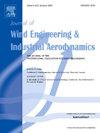宽槽桥面自持飘移的流场分析
IF 4.9
2区 工程技术
Q1 ENGINEERING, CIVIL
Journal of Wind Engineering and Industrial Aerodynamics
Pub Date : 2024-10-22
DOI:10.1016/j.jweia.2024.105927
引用次数: 0
摘要
本研究深入探讨了一座 5000 米宽槽桥面的扑翼机理,发现其运动是自持的,并不具有剧烈的破坏性。系统阻尼比不固定,只存在一个稳定轨道。在 10.5 米/秒的实验风速下进行的高分辨率 PIV 实验测量了迎风面和背风面的静态和动态流场。静态结果显示,迎风甲板上的前缘分离在参考范围内,而背风甲板上的分离难以观察到。动态测试在每个阶段都发现了迎风/背风甲板周围的瞬时涡流,而在阶段平均后,所有阶段的风速矢量中都没有涡流迹象,这表明涡流漂移假说不成立。对流线模式的分析表明,在振动过程中,迎风甲板上的前缘分离尺寸和重新连接长度会发生周期性变化,而背风甲板上的变化一直不明显。进一步研究发现,在振动过程中,背风甲板上的水平风速剖面有一种奇特的行为,这归因于扑翼过程中迎风甲板和背风甲板之间高度差的动态变化。研究表明,背风甲板上的异常风速剖面是由飘动过程中迎风甲板和背风甲板之间高度差的动态变化引起的,从而导致额外的风荷载。这些发现揭示了桥梁飘移的复杂动态,对大跨度桥梁的设计和维护具有重要意义。本文章由计算机程序翻译,如有差异,请以英文原文为准。
Flow field analysis of self-sustained flutter of a wide-slotted bridge deck
This study delves into the flutter mechanism of a 5,000 m bridge with a wide-slotted deck, finding that the motion is self-sustained and not violently destructive. The system damping ratio is not fixed, and only one stable orbit exists. High-resolution PIV experiments at an experimental wind speed of 10.5 m/s measured the static and dynamic flow fields on the windward and leeward decks. The static results showed leading-edge separation on the windward deck within the reference range, while separation on the leeward deck was difficult to observe. Dynamic testing identified instantaneous vortices around the windward/leeward deck at each phase, with no signs of vortices in the wind speed vectors at all phases after phase-averaging, indicating that the vortex drift hypothesis is not valid. The analysis of the streamline pattern revealed periodic variations in leading-edge separation size and reattachment length on the windward deck during the vibration process, while the leeward deck showed consistently inconspicuous changes. Further examination uncovered a peculiar behavior in the horizontal wind speed profile on the leeward deck during the vibration process, attributed to dynamic changes in the height difference between the windward and leeward decks during flutter. The study suggests that the unusual wind speed profile on the leeward deck is caused by the dynamic changes in height difference between the windward and leeward decks during the flutter process, resulting in additional wind loading. These findings shed light on the complex dynamics of bridge flutter and have implications for the design and maintenance of long-span bridges.
求助全文
通过发布文献求助,成功后即可免费获取论文全文。
去求助
来源期刊
CiteScore
8.90
自引率
22.90%
发文量
306
审稿时长
4.4 months
期刊介绍:
The objective of the journal is to provide a means for the publication and interchange of information, on an international basis, on all those aspects of wind engineering that are included in the activities of the International Association for Wind Engineering http://www.iawe.org/. These are: social and economic impact of wind effects; wind characteristics and structure, local wind environments, wind loads and structural response, diffusion, pollutant dispersion and matter transport, wind effects on building heat loss and ventilation, wind effects on transport systems, aerodynamic aspects of wind energy generation, and codification of wind effects.
Papers on these subjects describing full-scale measurements, wind-tunnel simulation studies, computational or theoretical methods are published, as well as papers dealing with the development of techniques and apparatus for wind engineering experiments.

 求助内容:
求助内容: 应助结果提醒方式:
应助结果提醒方式:


